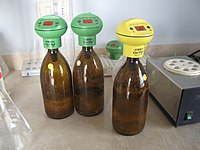
Photo from wikipedia
Supercapacitors are a kind of novel energy storage devices with long cycle stability and high power density. Electrode materials selection is one of the key factors that affect the properties… Click to show full abstract
Supercapacitors are a kind of novel energy storage devices with long cycle stability and high power density. Electrode materials selection is one of the key factors that affect the properties of supercapacitors. Biomass-derived electrode materials – being low cost, renewable and environmentally friendly – are therefore attracting researchers’ attention. In this work, we adopted a simple process of carbonization and activation with rice plant soot, a common biomass material, as carbon source, and finally obtained the nanoscale porous carbon electrode (NPCE) materials. Then, the electrochemical properties of the as-prepared NPCE materials were tested in 6 M KOH, and the results indicated that the specific capacitance could reach 216 Fg−1. Therefore, this low-cost, highly efficient technique is a significant milepost towards environmentally sustainable and commercially feasible fabrication of carbon electrode materials from biomass sources.
Journal Title: Journal of Wood Chemistry and Technology
Year Published: 2018
Link to full text (if available)
Share on Social Media: Sign Up to like & get
recommendations!